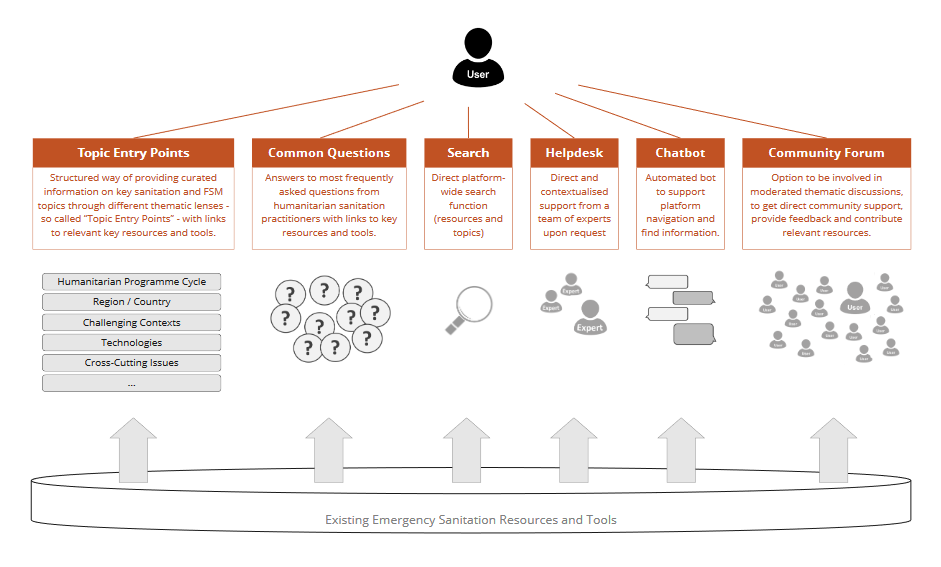How Is the Platform Structured and What Are the Different Ways to Access Information?
The Humanitarian Sanitation Hub brings together all available global knowledge on sanitation and Faecal Sludge Management (FSM) in emergencies in one platform. A wealth of information and resources can be accessed through various entry points for different topics, a common questions section, a platform-wide search function, a helpdesk, an automated chatbot and a community section.
Relevance/Importance
The Humanitarian Sanitation Hub is a comprehensive, structured, curated and moderated knowledge and exchange platform that responds to practitioners’ need for open source, up-to-date, quality-assured information on one platform. It serves as a first go-to-point, reference guide and constant companion for all those involved in planning and implementing sanitation and FSM interventions. The Hub enables and guides humanitarian WASH practitioners through simple, quick and easy access to contextualised, relevant resources and tools, advisory services and exchange. It aims to fill knowledge gaps continuously to improve humanitarian sanitation services.
The needs of individual users and how they wish to access information may vary significantly depending on, for example, the context, complexity and urgency of the local situation, project phase and the type of information required as well as users’ personal preferences on how to access information.
Overview
The Humanitarian Sanitation Hub aims to account for and accommodate different user needs and ways in which they may want to access information. It continuously compiles globally available resources and tools and provides different pathways to where and how information and resources can be accessed.
The Humanitarian Sanitation Hub aims to account for and accommodate different user needs and ways in which they may want to access information. It continuously compiles globally available resources and tools and provides different pathways to where and how information and resources can be accessed.

The six key pathways include:
- Topic Entry Points: is a structured way of providing curated information on key sanitation and FSM topics through different thematic lenses – so-called ’Topic Entry Points’. It is an extensive knowledge database of primary content exclusively created for the Hub; it provides a brief and quality-assured overview of the most important topics and links to key corresponding resources and tools (either directly available on the platform or with links to external platforms). The current topic entry points (each subdivided into various individual topics) include the following:
- Humanitarian Programme Cycle: provides key sanitation-related information along the entire HPC; it covers all relevant topics from assessment and planning, resource mobilisation, implementation and monitoring through to evaluation and preparedness.
- Challenging Contexts: provides detailed information on specific challenging contexts such as difficult climatic contexts (e.g. flood-prone or cold climates), ground conditions (e.g. unstable soils or sensitive groundwater conditions) or difficult settlement structures (e.g. urban areas, camps or contexts with limited accessibility).
- Region/Country: provides the option to directly search for regional or country-specific information, resources and tools such as case studies, standards, local designs, or bills of quantities. It can also be used to find regional/local experts or service providers.
- Cross-Cutting Issues: provides information on critical enabling factors (e.g. the institutional environment, financial arrangements or local skills and capacities), cross-cutting issues (e.g. hygiene promotion or market-based programming) and important links to other sectors (e.g. protection, agriculture or solid waste management) that should be considered and mainstreamed throughout the sanitation responses.
- Sanitation Technologies: provides information on different sanitation technology options and system configurations including design examples, case studies and bills of quantities.
- Glossary: A list of key sanitation terms and definitions.
- Common Questions: offers an up-to-date collection of the most frequently asked questions by humanitarian sanitation practitioners with corresponding answers and links to further resources, tools and other related topics. Answers to newly posed questions as well as answers to helpdesk requests will be continuously published in this section. The questions are listed in order of their asked-for frequency; they can also be browsed by theme.
- Platform-wide search: allows users to directly search for and access all resources, tools and information compiled on the platform.
- Helpdesk: provides direct contextualised support from a team of experts, supported by the FSM Technical Working Group of the Global WASH Cluster. The helpdesk is available for personal remote support to WASH practitioners facing specific sanitation challenges in emergency contexts. The Helpdesk can be approached to, for example, get advice about more complex issues, establish a direct connection with experts or WASH practitioners with relevant experience, help find specific resources or provide support to National Coordination Platforms (NCPs) to develop sanitation plans and strategies. Users can contact the Helpdesk via an Online Form that includes an indication of the urgency of the request. The expert team will provide a timely reply usually via email (or phone in case of more complex requests) or, for issues that require highly specialised knowledge, refer users to thematic or region-specific experts.
- Sanibot: is an automated chatbot to support platform navigation and find information. The chatbot will be available soon.
- Community Forum: provides an option to participate in moderated thematic discussions, get direct community support, provide feedback and for participants to actively contribute their own relevant resources. It is intended to bring important topics to the attention of the sector and promote networking between Hub users. The community forum will be available soon.
Still have questions?
You could not find the information you were looking for? Please contact our helpdesk team of experts for direct and individual support.

